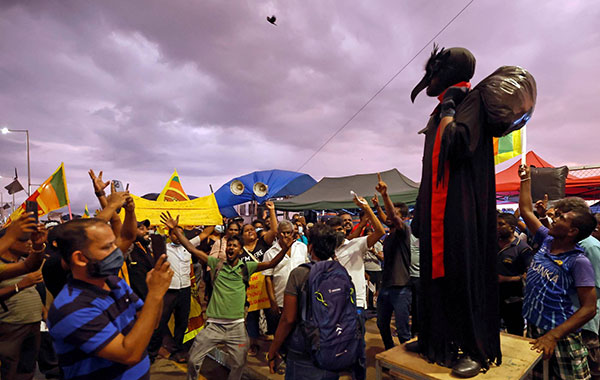Sri Lankan presidential contender Gotabaya Rajapaksa offered massive tax cuts ahead of the November 2019 election, which the current administration mistook for a campaign ploy.
Mangala Samaraweera, the finance minister at the time, convened a press conference to criticize the “dangerous” plan to decrease the value-added tax to 8% from 15% and eliminate other taxes. It was easy math to him: Sri Lanka earned less income than almost any other country, and its enormous debt burden required it to seek financing from the International Monetary Fund.
“Not only will the entire nation go bankrupt if these measures are adopted in this manner,” the minister said, “but the entire country will become another Venezuela or another Greece.”
In what has become a cautionary story for populist politicians maneuvering through a world of war, sickness, and rising inflation, it took nearly 30 months for his forecast to come true.
Rajapaksa passed the tax cut in his first cabinet meeting after winning the 2019 election, resurrecting one of Asia’s most powerful families. He then promptly reinstated presidential powers that his strongman brother, Mahinda Rajapaksa, had had during his 10-year administration, a period during which the family ended a nearly three-decade civil war until being booted out in 2015 by a public apprehensive of greater authoritarianism and indebtedness to China.
Rather of learning to lead with humility, Rajapaksa hastened to reinstate his family’s style of populist authoritarianism, laced with appeals to nationalism among Sinhalese Buddhists, who make up 75 percent of the population.
That tactic, however, rapidly failed. Sri Lanka has recently run out of currency to pay for basic necessities such as food and fuel, resulting in lengthy lineups for gasoline and daily 13-hour power outages. Irate citizens set fire to bread loaves and stormed the health ministry in search of medication.
For weeks, protesters have camped outside the president’s office in Colombo’s downtown district, demanding his resignation.
The Rajapaksa family is now in full damage control mode, rushing to guarantee that citizens have access to essential supplies while seeking emergency money from the IMF, World Bank, China, and other lenders.
For the first time since gaining independence from the British in 1948, it has stopped repaying foreign debt. The country’s stock exchange, which had risen following the tax cuts, is now the poorest performance in the world this year, trailing only Russia.
Furthermore, the Rajapaksas have been forced to backtrack on two significant programs they introduced following the election in 2019.

